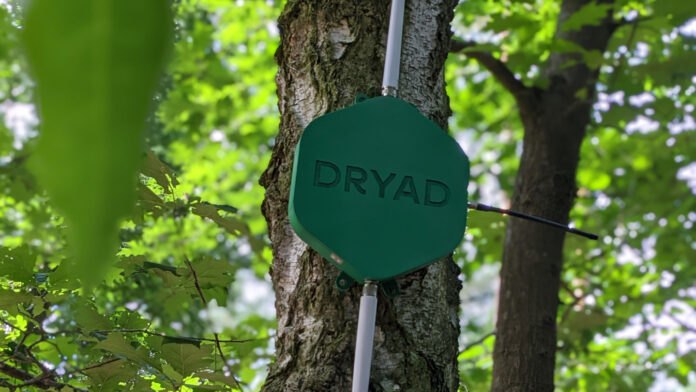Germany-based IoT company Dryad Networks, offering a planet-saving wildfire protection solution, and talked about in these pages a year ago as a “superstar on the LoRaWAN circuit”, continues to pick up useful-sounding contracts with government agencies, municipal authorities, forestry trusts, and private landowners variously in Australia, North America, and parts of southern Europe. The firm has just announced it is also working with the National Trust in the UK to install 50 wildfire detection sensors on Marsden Moor in West Yorkshire. It is its first UK win.
Dryad’s so-called Silvanet system of solar-powered sensors form a wide-area LoRaWAN mesh network and detect “subtle” changes in their local environment – “increased levels of certain gases or organic compounds” – to “sniff out” and “pinpoint” potential wildfires. The sensors, attached to tree trunks or fence posts, run a machine learning algorithm to counter false positives and use GPS tracking to “within 50 metres”; alerts are issued to the firm’s control centre, and relayed to local fire and forest services to tackle fires before they get out of hand.
The company’s progress, from the conference circuit and early trials to full deployments, represents the “first change in wildfire detection in over 50 years”, the company said, and signals a “new era in the fight against the devastation caused by these fires”. It said in a statement: “Traditional detection… has worked heroically for many years but the need for faster and more advanced wildfire detection has never been more evident.” Traditional methods include cameras, watch towers, and satellites, and only detect wildfires after they have penetrated the tree canopy.
By this time, they already require “massive response to get… under control”. Dryad states: “The difference in the damage a fire can cause for every ten minutes it remains undetected is staggering. Sensor networks cover large areas, providing comprehensive and highly scalable fire monitoring… By detecting fire threats within minutes, sensors provide a crucial window of opportunity for firefighters to get to where they need to be as quickly as possible. By pinpointing exactly where the fire started… most fires are able to be extinguished safely and easily.”
The wildfire season gets longer each year, the company notes – each time spreading to more regions, costing more lives and more damage, and more environmental catastrophe. Global wildfires chuck 7.8 tonnes of CO2 every year, equivalent to 20 percent of total global CO2 emissions. Eliminating wildfires would be like taking every car on the planet off the road, and grounding every plane and ship, too, the company’s chief executive, Carsten Brinkschulte, has repeatedly told IoT conferences around the world. It seems his message is getting through, finally.
The new deployment for the National Trust at Marsden Moor is to protect “the landscape, [and] its flora and fauna”. A fire in the area, a site of special scientific interest and a habitat for rare birds and plants, in April 2019 damaged 700 hectares of moorland and took four days to extinguish; a fire in 2021 needed over 100 firefighters to tackle it. Dryad said: “Devastating wildfires across Europe this summer should be a wakeup call… Dryad hopes [this] installation is a catalyst for landowners and public bodies to take action to mitigate wildfire risk and reduce the costs of firefighting.”
Brinkschulte commented: “Time is everything when it comes to managing wildfires and our technology gives firefighters the earliest, most reliable warning coupled with an exact location. Therefore, our aim is to give firefighters the best chance of extinguishing a blaze before it gets out of control and, subsequently, protect the world’s vital forests, making wildfires and their devastating effects a thing of the past.”
Last month, Dryad said it had partnered with Vodafone in Spain to put its solution through “rigorous testing to evaluate its effectiveness in early detection and prevention of forest fires”. Vodafone is looking to deploy the solution in Andalusia in southern Spain.

